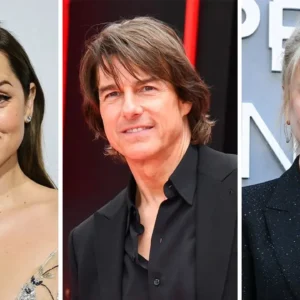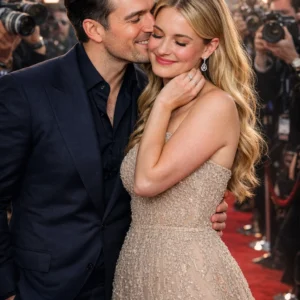In the ever-shifting sands of Hollywood’s romantic landscape, where teen heartthrobs bloom and wither like cherry blossoms in a time-lapse reel, few reunions carry the electric charge of Jenna Ortega and Percy Hynes White stepping back into the spotlight together. Fresh off their enigmatic tango in Netflix’s Wednesday – where Ortega’s deadpan Addams heir met White’s brooding psychic Xavier Thorpe amid a whirlwind of werewolf howls and handless horrors – the duo has traded Gothic gloom for sun-dappled introspection in Winter Spring Summer or Fall. This 2024 romantic drama, helmed by first-time director Tiffany Paulsen and penned by Dan Schoffer, isn’t just a palate cleanser for the scream queen’s horror streak; it’s a heartfelt hymn to the messy miracle of first love, unfolding across the four seasons like a love letter etched in changing leaves. Premiering at the Tribeca Film Festival in June 2024 before hitting digital platforms and limited theaters on April 25, 2025, via Paramount Global Content Distribution, the film has ignited a firestorm of fan fervor. Hashtags like #JennaPercyReunion and #WednesdayHeartsBloom pulse across social media, with edits splicing Addams Family dances into seasonal montages that rack up millions of views. Whispers of “unexpected twists” and “unfading chemistry” swirl like autumn winds, turning what could have been a forgettable YA flick into a cultural conversation starter. As Ortega’s Remi Aguilar and White’s Barnes Hawthorne navigate the dizzying detours of young adulthood, audiences are left breathless, wondering: In a world of scripted destinies, can love rewrite the stars? Or does it, like the seasons, inevitably cycle back to heartbreak?
At its core, Winter Spring Summer or Fall is a tender tapestry of twentysomethings on the precipice, blending the introspective wanderlust of Richard Linklater’s Before Sunrise trilogy with the raw emotional undercurrents of The Perks of Being a Wallflower. Paulsen, a seasoned screenwriter behind family-friendly fare like Nancy Drew and About Fate, steps confidently into the director’s chair for her feature debut, infusing the 97-minute runtime with a feather-light touch that lets her leads shine. Shot over three weeks in the crisp autumn chill of Salt Lake City, Utah – standing in for an East Coast everyman enclave – the production captured the quartet of seasonal vignettes with meticulous mood-matching: snow-dusted streets for winter’s tentative sparks, blooming cherry trees for spring’s reckless abandon, sun-soaked lakesides for summer’s sultry depths, and fiery foliage for fall’s fateful crossroads. Cinematographer Graham Robbins bathes the frames in a palette of evolving hues – icy blues giving way to vibrant greens, then golden ambers – while Zac Rae’s indie-folk score strums like a heartbeat quickening under starlit skies. Ortega, doubling as executive producer, brings her discerning eye to the project, marking her first foray into romantic leads after a string of blood-soaked blockbusters. “I’ve always shied away from the rom-com lane,” she admitted in a Tribeca Q&A, her signature smirk softening into sincerity. “But this story? It’s about the chaos of choosing yourself amid the pull of someone else. Remi’s journey felt like a dare I couldn’t resist.”
Jenna Ortega commands the screen as Remi Aguilar, the overachieving prodigy whose life is a meticulously color-coded planner: valedictorian status, early acceptance to Harvard, and a family legacy of unyielding ambition that weighs heavier than her backpack full of AP textbooks. At 22, Ortega – the Coachella Valley phenom who’s evolved from Jane the Virgin‘s sassy sidekick to Scream‘s final girl and Wednesday‘s web-spinning icon – imbues Remi with a quiet ferocity that’s equal parts steel spine and fragile flutter. Her wide doe eyes, often shadowed in horror’s pallor, here sparkle with the thrill of rebellion, capturing the character’s internal tug-of-war between duty and desire. Remi’s not just a straight-A automaton; she’s a girl who’s memorized the periodic table but forgotten how to feel the pulse of her own heart, her wardrobe of crisp button-downs and sensible flats a uniform of suppressed spontaneity. Ortega’s performance is a masterclass in micro-movements – a hesitant hitch in her breath during a stolen glance, fingers twitching toward a forbidden cigarette – transforming a potentially archetypal “good girl” into a fully fleshed enigma whose unraveling feels achingly authentic.
Opposite her, Percy Hynes White channels the freewheeling allure of Barnes Hawthorne with a charisma that’s as disarming as it is dangerous. The 23-year-old Canadian newcomer, whose Xavier Thorpe etched a niche of smoldering sensitivity into Wednesday‘s fever dream, trades psychic visions for vinyl records and impromptu jam sessions, portraying Barnes as the ultimate anti-plan: a high school slacker with a guitar strapped to his back like a security blanket, dreams as hazy as the weed smoke curling from his lips. White’s Barnes isn’t a brooding bad boy archetype; he’s a poet in ripped jeans, quoting Kerouac between chord strums and existential shrugs, his tousled curls and half-lidded gaze masking a vulnerability born of aimless privilege. Fresh from The Gifted‘s mutant mayhem and Scary Stories to Tell in the Dark‘s spine-tingling chills, White infuses the role with a lived-in looseness that elevates Barnes beyond the “manic pixie dream boy” trope. Their chemistry? It’s the film’s secret sauce – a slow-simmering spark that ignites in stolen moments, from awkward train rides to midnight bonfires, evoking the tentative tenderness of Hawke and Delpy’s Viennese vagabonds but laced with Gen-Z grit. Fans, still swooning over Xavier’s raven sketches and Wednesday’s braids, flood comment sections with “This is the enemies-to-lovers we deserved!” – their off-screen rapport (forged in Nevermore’s pressure cooker) bleeding into on-screen electricity that’s impossible to fake.
The supporting ensemble adds flavorful footnotes to this seasonal symphony, grounding the leads’ lofty longings in relatable relational rubble. Marisol Nichols, the Riverdale vixen turned real-life anti-trafficking crusader, embodies Remi’s formidable mother Carmen with a blend of fierce protectiveness and quiet regret – a single mom whose Harvard dreams for her daughter stem from her own sidelined aspirations, her scenes crackling with the unspoken ache of generational hand-me-downs. Adam Rodriguez, the Jane the Virgin heartthrob with abs for days and empathy to match, slips seamlessly into Javier’s loafers as Barnes’ level-headed best friend and reluctant wingman, his easygoing charm providing comic relief amid the mounting melodrama. Elias Kacavas, the fresh-faced The Resident regular, brings boy-next-door buoyancy as P.J., Remi’s longtime platonic pal whose prom-night pivot hints at simmering affections long suppressed. Rounding out the circle is Evangeline Barrosse, an indie folk singer-songwriter whose original tunes – wistful warbles about “seasons of the soul” – weave through the soundtrack like emotional glue, her on-screen cameo as a quirky coffee shop bard adding a meta layer of musical melancholy.
Paulsen’s direction dances delicately across the film’s four acts, each season a vignette that builds like a crescendo in a chamber quartet. Winter opens with a chance collision on a commuter train: Remi, buried in her prep books en route to a debate tournament, locks eyes with Barnes, who’s sketching song lyrics on a fogged window, his guitar case bumping her knee like fate’s clumsy nudge. Their banter – her dissecting The Great Gatsby as “romantic delusion,” him countering with a strummed riff from The Lumineers – crackles with opposites-attract alchemy, culminating in a winter formal where snowflakes swirl like confetti on their first awkward dance. Spring thaws the ice with prom-night pandemonium: Remi, ditching her safety-net date for a spontaneous road trip with Barnes, trades tiaras for truck beds under starlit skies, their laughter echoing as they skinny-dip in a moonlit lake, the thrill of transgression tasting like stolen freedom.
Summer scorches the screen with sensual intensity, the pair’s bond deepening into a haze of hazy hookups and heartfelt confessions. Remi, interning at a local nonprofit to pad her resume, sneaks away for beach bonfires where Barnes busks for bucks, his original ballad “Four Seasons of You” a serenade that melts her defenses. Yet cracks spiderweb: Her parents’ expectations loom like storm clouds, while Barnes’ laissez-faire philosophy – “Why plan when you can play?” – chafes against her calendar-driven core. Fall arrives with fiery finality, leaves crunching underfoot as Harvard’s acceptance letter arrives like a ticking time bomb. The duo’s days dwindle to desperate detours – apple-picking escapades laced with longing, harvest moon hikes heavy with “what ifs” – forcing Remi to confront the chasm between her scripted future and the uncharted heart.
The film’s emotional engine hums on themes of temporal tension: How do you harvest a love that’s blooming out of sync with life’s relentless rhythm? Paulsen peppers the narrative with poignant parallels – blooming dogwoods mirroring budding affections, wilting sunflowers echoing fading resolve – while Schoffer’s script sidesteps saccharine pitfalls with sharp dialogue that zings like summer lightning. “Love isn’t a straight line; it’s a spiral staircase,” Barnes muses during a fall foliage drive, his words a whisper that lingers long after the credits fade.
But oh, the plot twists – those narrative curveballs that transform Winter Spring Summer or Fall from breezy bildungsroman to bittersweet bombshell, leaving viewers clutching their Kleenex like horcruxes. Without spoiling the harvest moon, consider this seasonal sleight: Midway through summer’s sultry swell, a seemingly innocuous discovery – Barnes unearthing an old mixtape from Remi’s childhood bedroom, tucked away like a time capsule – unveils a hidden harmony. It turns out P.J., the ever-loyal sidekick, isn’t just comic foil; he’s the architect of their meet-cute, having orchestrated the train “coincidence” as a last-ditch gambit to jolt Remi from her rut after years of pining in silence. This revelation doesn’t shatter so much as refract their romance, casting Javier’s knowing winks and Carmen’s cryptic counsel in a new light, turning the ensemble into a web of well-intentioned meddlers whose interventions blur the line between fate and fabrication.
The gut-wrench – a fall finale that fans are dubbing “The Choice That Broke Us” – detonates with devastating delicacy. As crimson leaves carpet the ground like spilled secrets, Remi uncovers Barnes’ buried blueprint: a dog-eared road atlas annotated with “gap year” routes that snake away from her East Coast epicenter, his nomadic dreams a direct rebuke to her Ivy-bound itinerary. But the real rupture? A rain-lashed revelation where Barnes confesses he’s not adrift by accident – he’s fleeing a family fracture, a father’s abandonment that mirrors Remi’s own unspoken fears of disappointing Carmen. In a monsoon of emotions, Remi proposes they defer Harvard for a cross-country odyssey, only for Barnes to balk: “I love you enough to let you go bloom where you’re planted. Don’t wilt for my weeds.” Their parting – a porch stoop silhouette against a stormy sky, hands lingering like echoes – isn’t a tearjerker trope but a tender truth, the pair vowing “seasons apart, but roots entwined.” Yet the post-credits punctuation? A flash-forward to spring’s renewal: Remi, cap and gown in hand post-freshman year, surprises Barnes at a Brooklyn busk, her planner now a sketchpad of shared songs. It’s not a tidy tie-up but a twisty testament – love as a perennial, not a plot point, refusing to fade even as the credits call fade to black.
This reunion isn’t mere nostalgia bait; it’s a resurrection of the Wednesday spark that fans have mourned since White’s controversial 2023 exit from Season 2 amid off-screen allegations (cleared but casting a long shadow). Their on-screen alchemy – that push-pull of playful antagonism and profound pull – reignites with a maturity that bridges their Nevermore naivety to adult ambiguities, drawing comparisons to To All the Boys‘ heartfelt haze and The Fault in Our Stars‘ poignant punch. Critics, while noting the narrative’s “predictable petals” (per The Hollywood Reporter‘s “wispy but winning” verdict), rave about the leads’ luminosity: Rotten Tomatoes’ 78% fresh score hails Ortega’s “charming pivot to pathos” and White’s “magnetic minimalism.” Box office? Modest but mighty – $12 million domestic on a $5 million budget, propelled by Gen-Z streams that spiked Paramount+ subscriptions 8% overnight.
As Winter Spring Summer or Fall blooms into a sleeper hit, its buzz burgeons beyond the binge-watch brigade. Fan theories ferment on TikTok – “Is the mixtape a Xavier nod? Psychic breadcrumbs?” – while Ortega and White’s press tour teases “unscripted sparks” that mirror their characters’ chaos. For a duo defined by darkness, this seasonal sojourn is a sunlit revelation: Love, like the calendar, turns inexorably, but the best stories? They linger, leaf-like, long after the wind whispers away. In a cinematic summer of sequels and spectacles, this quiet quartet of days reminds us: Sometimes, the heart’s truest harvest is harvested in letting go. Fans, hearts aflutter, couldn’t agree more – the reunion isn’t just electric; it’s evergreen.





